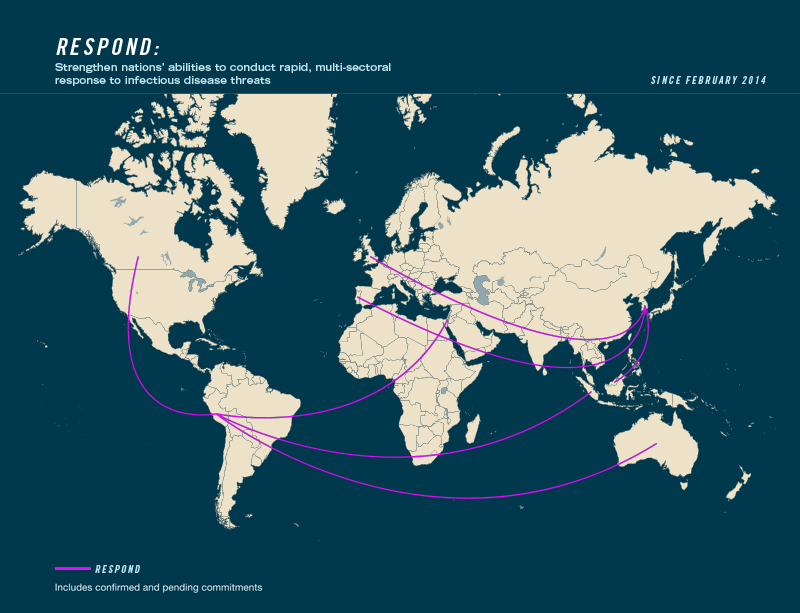Global Health Security Agenda: GHSA Linking Public Health with Law and Multisectoral Rapid Response Action Package (GHSA Action Package Respond-2)
As Measured by: Evidence of at least 1 response within the previous year that effectively links public health and law enforcement, OR a formal exercise or simulation involving leadership from the country’s public health and law enforcement communities.
Desired National Impact: Development and implementation of a memorandum of understanding (MOU) or other similar framework outlining roles, responsibilities, and best practices for sharing relevant information between and among appropriate human and animal health, law enforcement, and defense personnel and validation of the MOU through periodic exercises and simulations. In collaboration with FAO, International Criminal Police Organization (INTERPOL), OIE, WHO, individual Biological and Toxin Weapons Convention States Parties (and where appropriate the Implementation Support Unit), the United Nations Secretary-General’s Mechanism for Investigation of Alleged Use of Chemical and Biological Weapons (UNSGM), and other relevant regional and international organizations as appropriate, countries will develop and implement model systems to conduct and support joint criminal and epidemiological investigations in the event of suspected biological incidents of deliberate origin.
Country Commitments to Action Package:
- Leading countries: Republic of Korea, Peru
- Contributing countries: Australia, Canada, Indonesia, Israel, Malaysia, Portugal, United Kingdom
- Contributing international organizations: FAO, INTERPOL, OIE, WHO
Five-Year Action Items:
Actions will be coordinated, as appropriate, with relevant international organizations including FAO, OIE and WHO.
- Establish MOUs or other similar policy frameworks between and among health, agriculture, defense, security and law enforcement sectors at appropriate levels of government, and with relevant regional and international organizations. MOUs will include triggers for information sharing, methods by which information will be shared, guidance for addressing challenges and seeking external assistance, and parameters for joint investigations and interviews.
- Conduct annual trainings for security, public health, and animal health officials to increase capacity to respond effectively to biological attacks. Ministry of Defense personnel should also join, as they are often key stakeholders in the management of national disasters and emergencies, and international partners with relevant expertise and mandates should be invited to participate.
- Promote programmes and other assistance packages to help develop national and international capacities to support the building and maintenance of an effective operational capability for the UNSGM, to include i) logistics capabilities, development and testing of protocols and procedures, ii) identification and training for national experts in the diverse range of relevant disciplines required, and iii) helping to build improved and more extensive laboratory analytical capabilities to deal with biological samples (human, animal and plant) that could be collected in an investigation of alleged deliberate use of biological agents.
- Identify the relevant ministries or agencies to include the multi-sectoral response in case of biological event of suspected or confirmed deliberate origin.
- Identify the ministry or agency to conduct criminal investigation and epidemiological investigation, respectively.
- Review national laws and authorities to select a coordinating ministry or commission
- Develop procedures and protocols to respond bio-threats including risk communication for experts and general public, rapid response team with on-site rapid testing capacity supporting the development of international capacity to respond to deliberate disease events including Mechanism for Investigation of Alleged Use of Chemical and Biological Weapons (UNSGM).
- Develop and share a best practices toolkit for training.
- Conduct a scenario-based exercise (table-top or functional) under supervision of a coordinating ministry or commission.
- Conduct an annual multi-sectoral table-top or functional exercise with all activities covered under procedures and protocols.
- Review the result of an exercise with higher level government official’s attendance.
